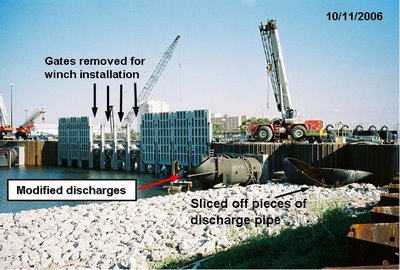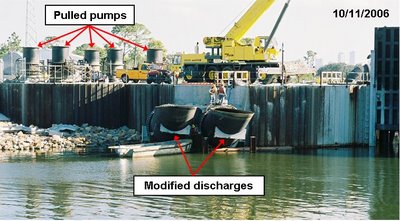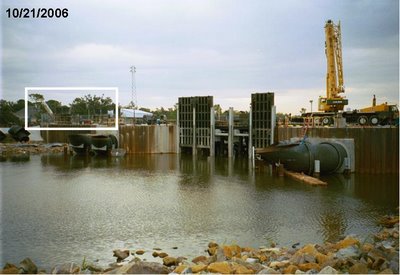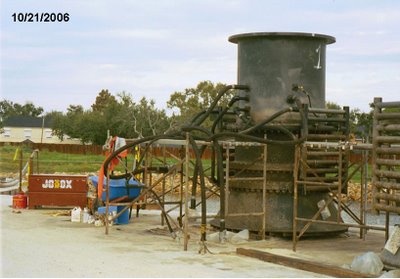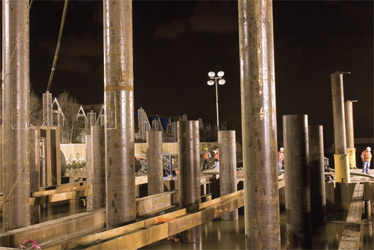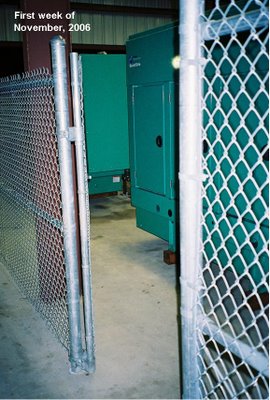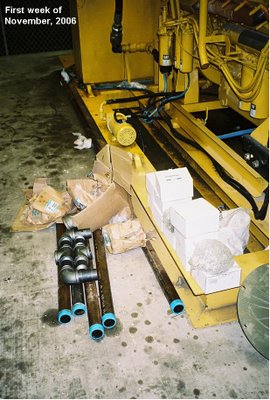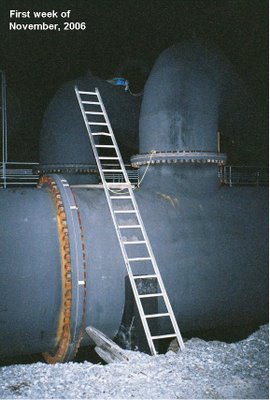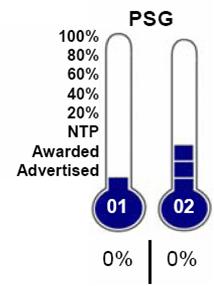Corrections posted 7/10/07I've
posted before about the frequency changers, and how they remain unrepaired over a year after the storm. Out of all the contracts the Corps could have issued, this one should have been the simplest (besides the roofs). Instead, they appear to be making it as complicated as possible.
When they issued the pump motor rewinding contracts in May, the Corps used a relatively simple emergency competitive bidding process that reflected the fact that the repairs were critical (never mind that they should have gotten the work started months before). But, despite the similarity of the damage, criticality, and method of repair, the frequency changer work has lain dormant. Recent moves by the Corps do very little to actually make a difference.
The Corps has issued a no-bid "set aside" contract to RES Contractors (full name Reeves Electrical Services) of Pierre Part, LA. To explain "set asides," here's
Colonel Norbert Doyle, the Corps' Acting Principal Assistant Responsible Contracting (or PARC),
testifying on November 2, 2005 in front of the House Katrina Committee:
"The Corps has made extensive use of standard authorities granted to us under the various small business set aside programs, especially in the area of 8(a) firms. Section 8(a) is a Small Business Administration business development authority to benefit minority owned, socially and economically disadvantaged firms. The program helps aspiring entrepreneurs build their businesses by helping them obtain government contracts. Participants can receive non-competitive awards up to $3 million during a 9-year developmental program. Many of these small companies are local and therefore are already in the area and available quickly to participate in recovery efforts."
There's a lot of information on the Small Business Administration's website about the
Section 8(a) program. Under this program, RES has been classified as "Small Disadvantaged Business." I'm sure they're deserving of that classification, and I don't have a quibble with that, or with the Corps' general use of the Section 8(a) program. What I do have a quibble with is the Corps' gumming up the works on this particular contract with an extra layer of non-publicly-bid bureaucracy.
You see, RES won't actually be doing the rewinding work on the frequency changers. It will likely be subcontracted to one of two firms with offices here in the New Orleans area:
Bollinger Quick Repair or
Scott Armature. Both are have shops accredited by the Electical Apparatus Service Association (EASA). Both were involved in the pump motor rewinding contracts. Both are totally capable of doing the entire scope of work. In fact, Bollinger has
already done partial rehabs on frequency changers 3 and 4 in Station 17. So the question is, why is the Corps doing this?
RES is not listed as an EASA member in Louisiana on
EASA's website. They don't have their own webpage. Their recent work for the the Corps doesn't indicate much motor rewinding. Here's a list of recent RES contracts I was able to cobble together:
- 10/28/05, London Ave. floodwall breach repairs and wall stabilization, $389,400.
- 12/15/05, London Ave. floodwall breach repairs and wall stabilization, $27,533.
- 11/11/05, 1350 KW sound attenuated fully packaged diesel generator, $96,325.
- 12/22/05, Generator installation and fencing installation, $6995.
- 5/1/06, Generator test, $3195.
- 8/28/06, Rehabilitation of Plaquemines Parish Pump Stations, Electrical Services, $701,591
- 9/28/06, design and construction of a Venice, LA, sub-office replacement building, $6,049,000.
Also, according to an August 14, 2006
article in the Times-Picayune, RES was a subcontractor on a number of FEMA trailer contracts. They also tried to get a separate contract for placement of handicapped-accessible trailers.
One other bit about RES... they are the "protege" in a "mentor-protege" relationship with the much larger Cajun Constructors, a long-time beneficiary of numerous lucrative Corps contracts. After Katrina, Cajun got the $23.9 million contract for repair of the east side wall on the Industrial Canal. With the addition of at least 13 change orders, the work grew to over $34.4 million. Cajun also received the work for the foundations on the same wall, totaling over $13 million. The Corps was so pleased with Cajun's work on the wall that they gave them Task Force Hope commerative coins, as noted in on the front page of
Cajun's April 2006 newsletter.
This is slightly off topic, but those coins are a perfect example of extraordinary government waste. According to their own
summary of Katrina contracts, the Corps paid a total of over $21,000 for souvenir coins in the wake of Katrina, with the first purchase coming just 23 days after the storm made landfall. A Corps employee paid Brown's Trophies of Tampa, FL $2404.60 using a Visa card on September 20, 2005, while New Orleans remained flooded. You can find the contracts on rows 1055, 1068, and 1280 of that spreadsheet. According to the
Brown's Trophies website, the Corps doesn't appear to be only government agency to come calling for coins.
Getting back to the Cajun-RES mentor-protege relationship... The mentor-protege program is part of the Section 8(a) program as explained at
this SBA webpage. It allows smaller companies (the protege) to team up with bigger ones (the mentor) so that the protege can have a chance at bigger contracts. However, the system also works the other way, allowing favorite government contracting giants like Northrop Grumman, EDAW, URS, Johnson Controls and dozens of similar firms yet another bite at no-bid, hardly advertised contracts supposedly intended for smaller, disadvantaged companies. Among the benefits to the mentor:
- The mentor receives cash incentives and reimbursements from the government for being a mentor.
- The mentor can bid for the protege's contracts through joint ventures with the protege.
- There are no real limits on the number of proteges the mentor can sign up with (according to this press release, Northrop-Grumman has 15 active Department of Defense mentor-protege agreements. The Pentagon has its own program, which appears to be similar to the one at the SBA.)
- The mentor can hold an ownership stake of up to 40% in the protege company.
You can find the Cajun-RES relationship, as well as many others, documented on
this SBA spreadsheet.
The relationship can also be traced through the Louisiana Secretary of State Corporations Database. (See corrections in following two paragraphs)
Cajun Constructors shares an address (15635 Airline Hwy, Baton Rouge, LA 70817) with "TIG, LLC."
TIG, LLC is a company organized on the same day as "T.I.G. Enterprises" - July 5, 2005. (
correction: T.I.G. Enterprises was founded in 2000, five years before TIG, LLC. While T.I.G. Enterprises and TIG, LLC have very similar names, they are definitely
not the same company. I regret the error.). TIG, LLC has as its manager the owner and founder of Cajun Constructors - L. Lane Grigsby, who also has an ownership stake in at least eight other companies at 15635 Airline. Mr. Grigsby is also on the board of The Shaw Group, which has received numerous Corps and FEMA contracts since Katrina, some of which were subcontracted to Cajun (including the supply of over 40 diesel pumps to help in the unwatering effort in New Orleans).
T.I.G. Enterprises is owned by Michael Tipton of Pierre Part, who also owns RES and two other companes in Pierre Part. It would not be surprising if this mentor-protege relationship played some role in RES landing this job.
[R.E.S. has
its own webpage as of early April, 2007. On their
News page, they note their Mentor-Protege relationship with Cajun.]
There's another discrepancy. Here's the latest public schedule of Orleans Parish pump station repairs, as of October 19th, 2006 (click to enlarge):
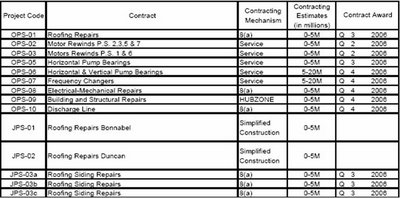
As you can see, the frequency changer contract, OPS-07, is listed as a "service" contracting mechanism, not an "8(a)." There's no indication of what happened to change the type of contract.
From the outside, this appears to be typical Corps contracting shenanigans, leaving the citizens of New Orleans holding the bag.
By the way,
the latest internal Corps schedule shows that the frequency changer work is not due to be completed until November, 2007. Here's a few more details from that internal schedule:
OPS-7A: Frequency changers Carrollton Building Advertise contract: 10/19/06 (originally 8/30/06)
Award contract (notice to proceed): 11/15/06 (originally 10/6/06)
Construction complete: 7/15/07 (originally 4/6/07)
Duration of construction: 8 months (originally 6 months)OPS-7B: Frequency changers Station 17Advertise contract: 10/19/06 (originally 8/30/06)
Award contract (notice to proceed): 11/15/06 (originally 10/6/06)
Construction complete: 11/15/07 (originally 4/6/07)
Duration of construction: 12 months (originally 6 months)It's bad enough that the repairs will now take far longer than previously envisioned. What's worse is that it is over a year after the storm, and the Corps
still can't figure out the scope and length of work for equipment they supposedly surveyed last December. A doubling of construction time is a
huge error in estimating, and raises troubling questions about the competency of the project managers leading the pump station repair efforts.
In sum, I suppose this contracting chicanery shouldn't really come as a surprise. After all, Colonel Doyle also said this in his testimony last November:
"It is our goal, however, to return to standard procurement operations as soon as possible. The Corps is currently moving in that direction."
In plain English, that translates into "business as usual."






